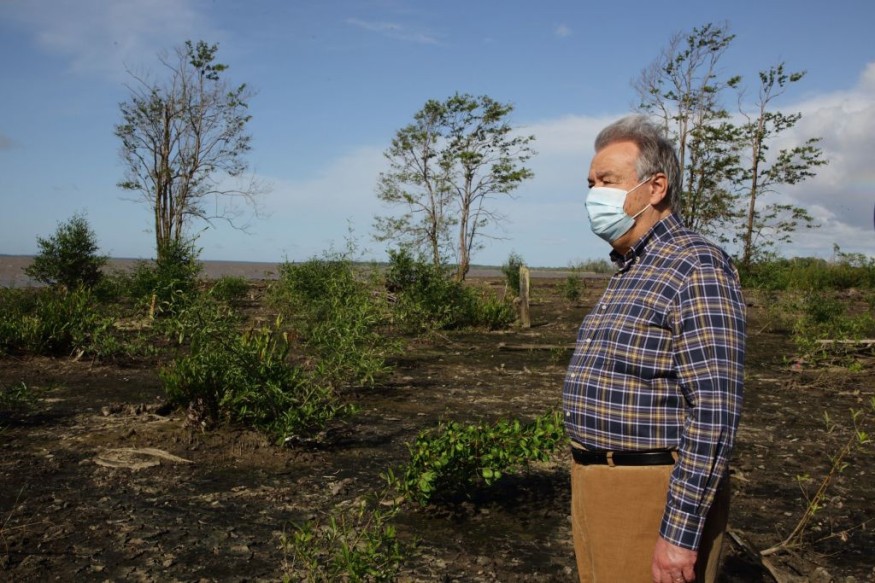
Despite academics stressing that reducing planetary heat to 1.5°C is rapidly escaping from human control, researchers understand this would require a massive attempt to accomplish.
However, the magnitude of decarbonisation necessary has now been accomplished - albeit unexpectedly and somewhat by mistake.
Limiting Global Warming
According to a recent analysis published in Nature Geoscience, worldwide carbon dioxide (CO2) outputs declined by 6.3%, or around 2,200 metric tons (MtCO2), in 2020.
In his statement Tsinghua University Earth system scientist Zhu Liu and associates wrote in their journal article that this has been the highest total annual decline in carbon output, greater than the emission levels decrement of the 2009 economic meltdown (380 MtCO2), and sometimes even higher than that of the drop reconfigured at the end of World War II (814 MtCO2).
However, if researchers implemented identical adjustments in a safe fashion, humans would be able to accomplish these carbon credits with substantially fewer adverse repercussions.
By example, the investigators discovered the largest independent driver in emissions reductions, responsible for nearly a third of the decline, was indeed the enormous decline in transport services - automobiles as well as tractor trailers.
So, rather than shutting down much of this transportation, specialists might accomplish significant cost savings by propelling it with sustainable power, Science Alert reported.
As to the Australian National University climatologist Nerilie Abram, who has not been part of the research, informed the Australian Broadcasting Corporation, it is a brilliant example that it is effective to minimize the greenhouse gases, designers merely require to pick the manner they are heading to use it.
Further research released this week in OECD revealed that restricting CO2 emissions to 1.5 °C could minimize hazards to people by roughly 40% opposed to a 2 °C forecast and up to 85% relative to a 3.66 °C situation.
Rachel Warren, an atmospheric expert at the University of East Anglia, and her associates utilized 21 different forms of computer simulations to evaluate water crisis, rising temperatures, illnesses, inundation, famine, even socioeconomic repercussions.
Researchers determined that with every threshold of temperature, millions more individuals would be subject to catastrophic famine.
However, limiting worldwide warming to 1.5 °C might lower international negative ramifications by 20% relative to a 2 °C future, as well as cut the number of individuals vulnerable to malaria and dengue illness by 10%.
How the Pandemic Helped Against Global Warming
Emissions of carbon dioxide were recovered to 2019 proportions after the lockdowns, according to Liu and colleagues.
Researchers propose directing global epidemic rehabilitation quantitative easing into prevention initiatives, however, note that the funds for this kind of assistance are still concentrated by natural gas expenditures.
These are the kinds of structural issues that should be addressed in order to achieve long-term effects, and such adjustments are now beginning.
Nevertheless, exceeding 2°C might be costly to human existence, resulting in cycles of irrevocable die - offs and persistent harm to countless species, according to University of Cape Town ecologist Joanne Bentley and collaborators in The Royal Society Publishing.
Regardless if the 1.5 °C objective radiates outward, each quarter of a temperature of heating up contributes.
The 1.5 °C objective also was merely supposed to offer something real to aspire towards, it's not a mystical factual figure.
Furthermore, specialists already have prevented some of the worst-case circumstances, and scientists sympathise that the humanity still have a good chance of keeping greenhouse effect below 2 degrees Celsius.
"If humans eventually wind up at 2ºC, that's a tad nicer than where humans were two decades ago, which was 5 °C.," Texas Tech University climate scientist Katharine Hayhoe told New Scientist.
© 2025 NatureWorldNews.com All rights reserved. Do not reproduce without permission.





